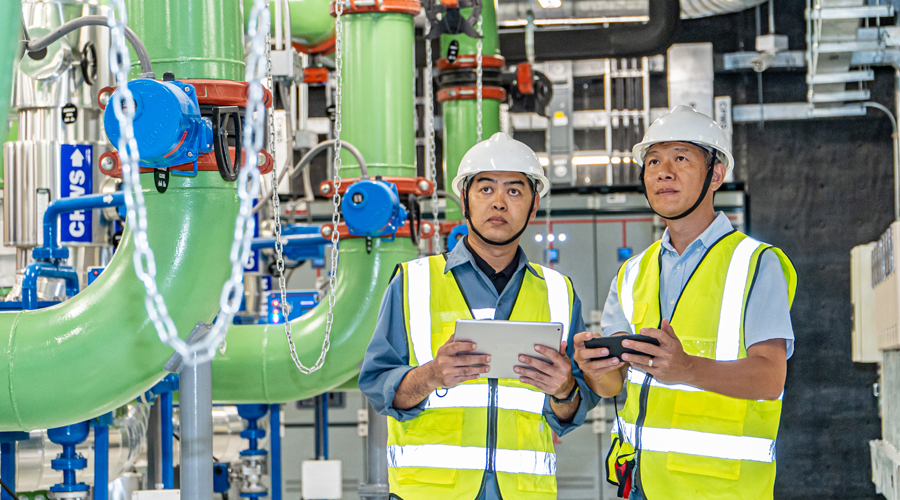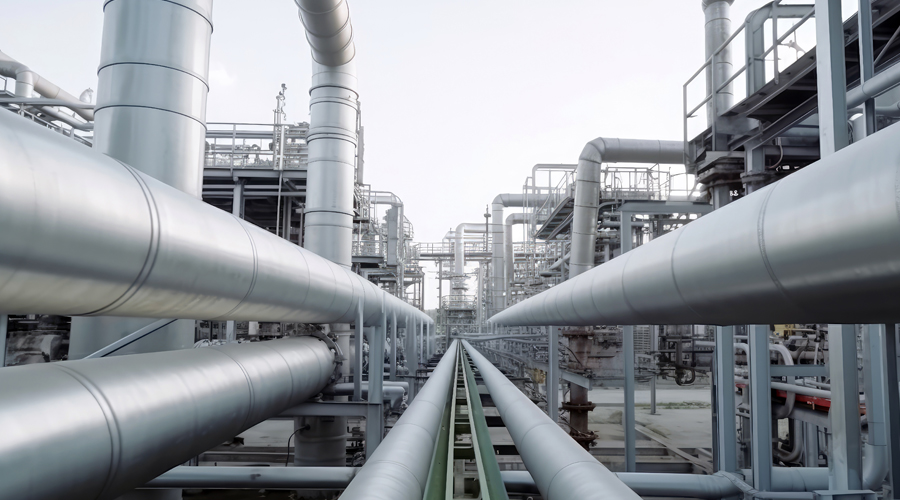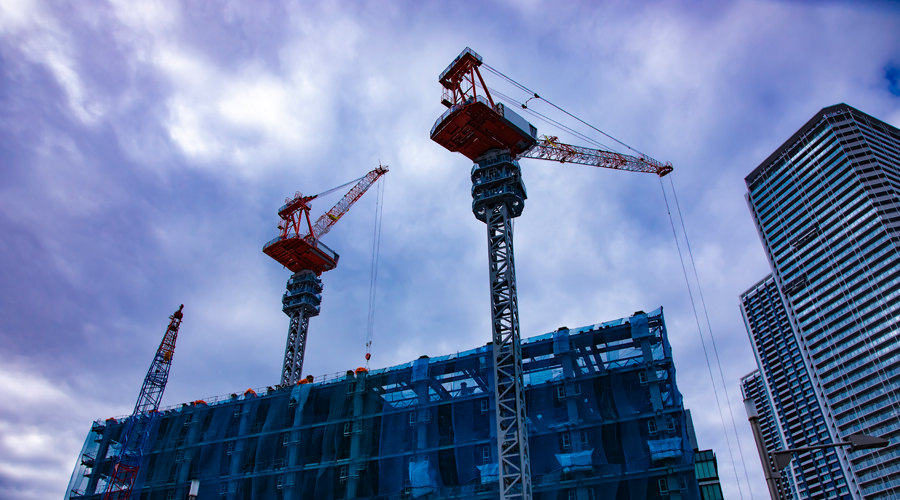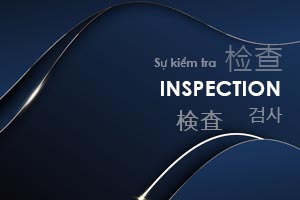Contact us ?
Your challenges
Keeping industrial infrastructures in good working order, whatever the field of activity (chemicals, petrochemicals, gas, agri-food, etc.), is a key concern for the companies involved. The safety of people, the environment, the continuity of production processes and the availability of equipment are all at stake.
- Reducing costs: Industrial maintenance makes it possible to anticipate production stoppages in the event of breakdown. This reduces the loss of revenue caused by unplanned downtime.
- Improve reliability: Regular, preventive maintenance enables faults to be detected before they cause breakdowns. Industrial maintenance also helps to extend the life of equipment by operational.
- Optimizing performance: Well-maintained equipment operates more effectively and efficiently, which can improve production performance and reduce waste and losses.
- Ensuring safety: Industrial equipment can present safety risks to workers if it is not properly maintained. Industrial maintenance enables safety problems to be detected and corrected before they cause accidents or injury.
- Comply with standards and regulations: Industrial equipment must be maintained in compliance with standards and regulations to avoid penalties. Industrial maintenance ensures that equipment complies with regulations.
- Preserve asset value: Industrial equipment is often a major investment for companies. Industrial maintenance helps to extend the life of equipment. This helps to preserve the value of the company's assets.
- Guarantee product/equipment conformity: By determining whether a product is compliant or not, we can limit the risk of defective products/equipment leaving the production site and damaging the company's image.
Apave solutions
in Asia


Pressure equipment inspection
Pressure equipment (including gas cylinders) are vessels designed to contain liquid or gas at a pressure higher than that of the natural environment. This type of equipment is commonly found in industrial facilities, but also in residential buildings, and private homes (boilers). Pressure equipment is useful and important for daily functions, however the difference in the interior pressure of the equipment and the outside environmental pressure can make for potentially dangerous situations. In order to ensure the safety of this type of equipment, inspections are carried out on new pressure equipments (before installation and use), as well as on in-service equipment to determine their integrity and normal functioning.
One of Apave’s major areas of intervention for new pressure equipment is shop inspection services. With regards to in-service pressure equipment, Apave's API/ASME inspectors, along with its Non Destructive Testing (NDT) inspectors, undertake inspections to assess the remaining life of equipment based on local or international standards.
Apave also undertakes the inspection of pressurized safety devices.
Heat exchanger inspection
Heat exchangers are devices that are designed to transfer heat between two or more gases or liquids of different temperatures. As is the case with most types of equipment, heat exchangers should be consistently inspected to ensure that they are functioning correctly and do not pose a danger to its owners or users. Regular maintenance and inspection also allow for anomalies to be identified before they become a safety concern. Apave’s inspection of heat exchangers is combined with NDT to identify defects on the equipment.
Inspection of steam boilers and fired heaters
Newly manufactured equipment:
- Material inspection
- Welding inspection
- Installation & alignment inspection
- Non-destructive testing
In-services inspection during shutdown periods for maintenance purposes:
- Safety assessment
- Thickness measurement
- Corrosion checking
- Visual assessment


Tank inspection
New manufactured tanks, including cylinder & sphere tanks:
- Material inspection
- Welding inspection
- Installation & alignment inspection
- Non-destructive testing
In-services inspection for corrosion monitoring purpose:
- Thickness measurement
- Crack checking
- Visual assessment
Piping and Pipelines inspection
- Material inspection
- Welding inspection
- Installation & alignment inspection
- Non-destructive testing
- Corrosion monitoring
- Inspection by a qualified inspector (API 570) to assess the remaining life of pipelines based on local or international standards
Gas flare inspection
Gas flares, also known as flare stacks, are gas combustion devices in the form of a tower commonly used in industrial plants such as chemical plants and petroleum refineries. This system uses an open flare to safely and efficiently discharge the facilities' waste or contaminated by-products by burning them.
Inspection for this equipment is similar to piping inspection, but sometimes a working solution at height must be used such as rope access or scaffolding solutions for installed gas flares.
Structure inspection
The consistent inspection of structures allows clients to determine their condition and identify any deterioration. This inspection will also allow for the type, cause and rate of deterioration to be identified allowing for necessary actions to be put in place (maintenance plans, repairs, etc.).
- Visual inspection
- Painting inspection
- Bolts & nut inspection
- Weld inspection
Painting, Blasting & Coating inspection
Coating and painting inspection services allow you to ensure that the coating and painting process is done in accordance with project requirements. Apave’s inspectors supervise the painting process according to specific requirements (humidity, temperature, surface, thickness, timing, etc.) in the fabrication & construction phases. Our coating and painting inspectors also perform a visual inspection and measure the coating / painting thickness in the operation phase. Apave also undertakes coating and painting inspection using rope access techniques, allowing inspectors to access difficult-to-reach areas without the need for scaffolding or other materials.


Inspection of Lifting Equipment and Machinery
In order to ensure the safety of workers, it is vital that machinery is inspected to verify that it is in good working condition and in order to identify any deterioration that requires remedying before it is prone to causing an accident or breakdown. In Vietnam, Apave provides inspection of lifting equipment and machinery, ensuring that the lifting angle is correct and protecting the lifting slings and chains from sharp edges. Equipment and machines are put under tension to test the safety of their lifting capabilities, not only checking the lifting equipment operation process, but also checking the safety of the lifting equipment before use. This type of inspection also involves checking that there is proper communication between the team members who are responsible for operating such machines, and checking that the team members know how to handle both the machines and themselves in the presence of said machines.
- Assessment in the fields of mechanics/lifting
- Services on offshore and port cranes
- Machines
- Training
- Maintenance
Welding
Welding is a fabrication process that joins materials, usually metals or thermoplastics, by using high heat to melt the parts together and allowing them to cool, causing fusion. Welding is distinct from lower temperature metal-joining techniques such as brazing and soldering, which do not melt the base metal. It is a very important process in construction projects. Welding inspection is always the most important step when implementing these kinds of projects.
Apave provides the following welding services:
- Welding inspection
- Welding consultancy: WPS, PQR, WPQ
Preheat and Post weld heat treatment inspection
Post weld heat treatment (PWHT) is a controlled process in which a material that has been welded is reheated to a temperature below its lower critical transformation temperature, and then it is held at that temperature for a specified amount of time. It is often referred to as being any heat treatment performed after welding; however, within the oil, gas, petrochemical and nuclear industries, it has a specific meaning. Industry codes, such as the ASME Pressure Vessel and Piping Codes, often require mandatory performance of PWHT on certain materials to ensure a safe design with optimal mechanical and metallurgical properties.
Valves inspection
- Material inspection
- Non-destructive examination
- Hydro Test
- Performance inspection
- Visual inspection
Rotating machine (Pump, Compressor, Blower)
- Material inspection
- Non-destructive examination
- Hydro Test
- Balance Test
- Performance inspection
- Visual inspection
Focus on our
Lifting Equipment Inspections
Lifting equipment inspection and certification process begins from the time an equipment is manufactured for lifting purposes and periodic thorough examination and testing as per the international standards, local regulations and operating company requirements that are crucial in verifying the equipment. Regular inspections and testing of lifting equipment such as cranes, winches, forklifts etc. are crucial to ensuring longevity and reliability of the equipment.
The inspection and certification services for:
- Onshore and offshore Lifting equipment
- Marine equipment
- Lifesaving equipment (Lifeboat /Life Raft/ Rescue Boat davits etc)
- Heavy Lift cranes and Heavy lift synthetic and Steel wire rope slings
- LOLER inspection of Lifting equipment and loose lifting gears
- Lifted equipment / Offshore container / Unit certification
- Earthmoving equipment and other machineries
Other lifting equipment services:
- Factory Acceptance Test (FAT) and Site Acceptance Test (SAT) of Lifting equipment
- Crane’s health check
- Gap Analysis for oil operating companies’ (OPCO’s) lifting assets.
- Lifting Technical Audits
- Refurbishment stage inspection of offshore and onshore cranes, marine equipment etc.
- Lifting plan review and validation services
- Marine equipment calibration witness and certification
- MRT and inspection of steel wire rope
- Bollard-pull test, and towing gear inspections
- Sea fasting inspection and verification
- Sea trials and fitness/condition inspection of Lifeboats
- Certification of Diving Equipment as per IMCA
- Zone-II Certification of diesel driven machines in this page
- Supply of water bags, load cells and solid test weights for the load test
Our other services
Our strengths

OUR CUSTOMER RELATIONSHIP APPROACH

OUR EXPERTISE



